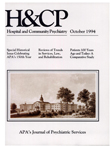Homeopathy and the Treatment of Mental Illness in the 19th Century
Abstract
In the 19th century, when bleeding and purging were widely used in mainstream medicine, homeopathy was warmly embraced by some U. S. practitioners as a more humane alternative. Developed by the German physician Samuel Hahnemann, homeopathy sought to cure symptoms of disease by use of drugs that induced similar symptoms and restored the patient's "vital force." This paper describes the general principles of homeopathy and recounts specific treatments of mental illness from the homeopatbic literature. it also describes the application of homeopathic principles to the institutional care of mental illness, using New York's Middletown Homeopatbic Asylum for the insane as an example.
Access content
To read the fulltext, please use one of the options below to sign in or purchase access.- Personal login
- Institutional Login
- Sign in via OpenAthens
- Register for access
-
Please login/register if you wish to pair your device and check access availability.
Not a subscriber?
PsychiatryOnline subscription options offer access to the DSM-5 library, books, journals, CME, and patient resources. This all-in-one virtual library provides psychiatrists and mental health professionals with key resources for diagnosis, treatment, research, and professional development.
Need more help? PsychiatryOnline Customer Service may be reached by emailing [email protected] or by calling 800-368-5777 (in the U.S.) or 703-907-7322 (outside the U.S.).



